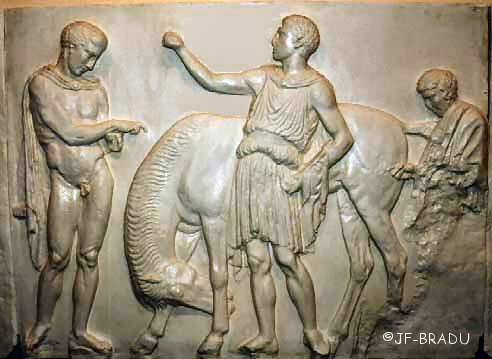|
In
opposition to the Doric frieze, the Ionic frieze of the Parthenon is
sculptured in low-relief,
the sculptures slightly protrude from the slab where they are carved. The
frieze begins on the West side, the only side where slabs have been left
in their proper place; but it is difficult to see them from the outside.
We are going to restitute the largest part( the most meaningful and the
least damaged ones), of the existing slabs to be found in museums( for
some of them have been lost) in their original order. We will mention
where these slabs are to be found nowadays(BM for the British museum in
London; ACR for the museum of the Acropolis in Athens; LOUVRE for the
museum of the Louvres in Paris)
.
A little trip to London was necessary to achieve this work.
The
slab below is not an original one; it is a restitution of B.M. of the slab
24 (still in its right place) on the West side; but it clearly shows off
what a low-relief means .
A
young man (ephebe) is pointing at a horse he has to mount for the
procession of the Panathenaea. In the centre, a master of ceremonies is
giving his instructions for the parade.. |


